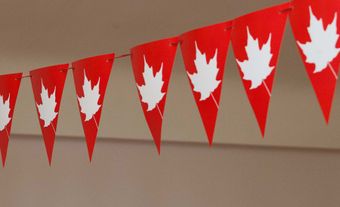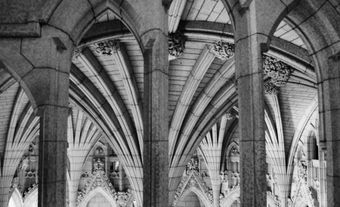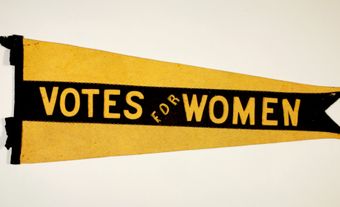Newfoundland and Labrador
Newfoundland, the youngest of the Canadian provinces, joined Confederation in 1949. Some portion of its coast was undoubtedly one of the first parts of the continent seen by Europeans. Its total area is 405, 720 km2, of which Labrador makes up almost three-quarters (294,330 km2).
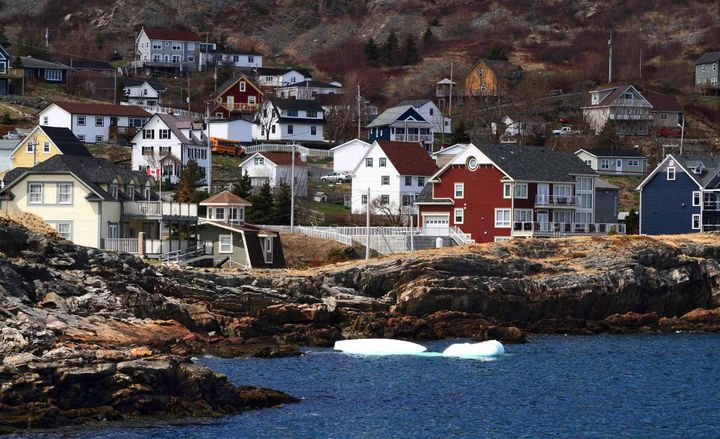
-
January 01, 0985
People
Bjarni Sights America
Bjarni Herjolfsson sighted mainland North America, probably Newfoundland, southern Labrador and Baffin Island. Bjarni was likely the first European to visit North America, and his discovery led to a brief Norse colonization of Newfoundland.
-
April 02, 1534

People
Cartier Reaches Labrador
French explorer Jacques Cartier arrived on the coast of Labrador. He further explored the Gulf of St Lawrence, discovering the Magdalen Islands and PEI.
-
January 15, 1540
Government and Politics
Roberval Made Viceroy
Jean-François de la Rocque de sieur Roberval was appointed viceroy of Canada, Newfoundland and Labrador, and given a mandate to establish a permanent colony.
-
August 05, 1583

Disasters Government and Politics
Gilbert Claims Newfoundland
Sir Humphrey Gilbert took possession of Newfoundland for Elizabeth I. He drowned in a storm on 9 September off Sable Island in Canada's first recorded marine disaster.
-
July 05, 1610

People
Founding of Cupids Bay
John Guy and 39 settlers departed Bristol, arriving in Newfoundland in August. Though his settlement at Cupids Bay lasted only to 1628, its founding was a signal event in the early history of Newfoundland.
-
November 13, 1637
Government and Politics
Kirke Governor of Newfoundland
Sir David Kirke of the Company of Adventurers (later, the Hudson’s Bay Company) became co-proprietor and governor of Newfoundland. Newfoundland still uses Kirke’s coat of arms, granted to him by King Charles I in 1638, as its own.
-
September 09, 1775
Disasters
Hurricane Hits Newfoundland
The so-called Independence Hurricane hit off Newfoundland, and drowned several thousand seamen, most of them British.
-
June 01, 1800
People
First Smallpox Vaccinations
The first smallpox vaccinations in Canada (and possibly in North America) were given by Dr. John Clinch of Trinity, NL. By the end of 1801, Clinch had vaccinated 700 people in the area. The disease wasn’t eradicated until 1977, but vaccination gradually checked the devastating epidemics that Canada had experienced since the 17th century.
-
March 30, 1809

Government and Politics
Labrador Act
The Labrador Act gave Labrador to Newfoundland.
-
May 09, 1812
People
The Royal Newfoundland Fencibles Mobilize
The Royal Newfoundland Regiment of Fencible Infantry, a provincial unit formed in 1803, was ordered into Upper Canada to form five companies for naval service in protection of the Great Lakes.
-
September 22, 1818
Sports and Culture
St John's Regatta
The first regatta in St. John's, Newfoundland, was reported in the local journal, though it is impossible to say exactly what year the race began. Despite stretches when the regatta was not held, it is considered the oldest continuing sports event in North America.
-
February 12, 1819
People
Birth of Sir Frederic Bowker Terrington Carter
Politician Sir Frederic Bowker Terrington Carter was born in St. John’s, Newfoundland. A Father of Confederation, Carter attended the Québec Conference. Though he supported Confederation, he was unsuccessful in bringing Newfoundland into the new nation, and gradually distanced himself from the idea.
-
June 06, 1829

Indigenous Peoples
Last Beothuk Dies
Shawnadithit was captured by English furriers in 1823, and her drawings and descriptions of the Beothuk are valuable records of her people. Like so many Beothuk, she died of tuberculosis.
-
January 01, 1833
Government and Politics
First Assembly in Newfoundland
The first representative assembly met.
-
May 26, 1846

Government and Politics
Responsible Government in Newfoundland
Public meetings at St John's, Newfoundland, adopted resolutions in favour of responsible government.
-
June 09, 1846
Disasters
Fire Destroys St. John's, 1846
A fire in St John's, Newfoundland, levelled most of the city.
-
August 12, 1858

Communication and Transportation
Telegraph Message to Valencia
The first telegraph message was sent from Trinity Bay, Newfoundland, to Valencia, Ireland, on cable laid by USS Niagara and HMS Agamemnon.
-
October 09, 1867
People
Jackman's Heroism
In one of the greatest stories of heroism ever recorded, William Jackman threw himself into the icy water off Labrador and rescued 11 of the 27 crew of a foundered ship unassisted. With the help of others he swam out 16 more times.
-
August 15, 1875
People
Birth of Robert A. Bartlett
Renowned Arctic explorer Robert A. Bartlett was born in Brigus, Newfoundland. Bartlett accompanied explorer Robert Peary on three journeys to find the North Pole. In 1913 he captained the doomed Karluk for the Canadian Arctic Expedition. Bartlett’s quick thinking during the Karluk’s sinking saved his crew and the ship’s supplies.
-
March 18, 1891
Government and Politics
Newfoundland WCTU Presents Suffrage Petition
Some 50 members of the Woman’s Christian Temperance Union presented petitions at the St. John’s Colonial Building. The signatures, requesting the municipal franchise, had been collected across the island. The petitions were met with scorn. Though the House of Assembly held two debates, the measure was defeated each time.
-
July 08, 1892
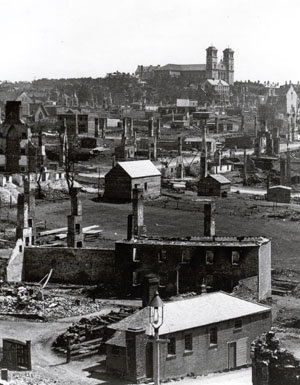
Disasters
Fire Destroys St. John's, 1892
A fire broke out in a barn on Long's Hill and swept through St John's. Some 12,000 people were left homeless after two-thirds of the city was destroyed.
-
March 01, 1900
People
Death of Sir Frederic Bowker Terrington Carter
Sir Frederic Bowker Terrington Carter, a Father of Confederation, died in St. John’s, Newfoundland. Born into one of Newfoundland’s prominent families, Carter was a life-long politician. He served as prime minister of Newfoundland for several terms before being appointed to its Supreme Court. Carter became Newfoundland’s chief justice in 1880.
-
April 20, 1902
Sports and Culture
Birth of Elizabeth Goudie
Writer Elizabeth Goudie, whose autobiography, Woman of Labrador, made her internationally known, was born at Mud Lake, Labrador.
-
April 08, 1904
Government and Politics Resources and Environment
Lansdowne-Cambon Convention
By the Lansdowne-Cambon Convention France surrendered the right of French fishermen to land on certain coasts of Newfoundland to dry fish.
-
July 30, 1905
People
Death of Sir Ambrose Shea
Sir Ambrose Shea, a Father of Confederation, died in London, England. Shea attended the Québec Conference and was pro-union, yet the majority of Newfoundlanders did not share his feelings. He was also one of the few Catholics in Newfoundland to support Confederation, which strained Shea’s relations with his political colleagues.
-
September 06, 1910

Resources and Environment
Newfoundland Regulates Fishery
An international tribunal ruled that Newfoundland may regulate fisheries used not only by Newfoundland fishermen, but also by Americans and Canadians.
-
April 14, 1912
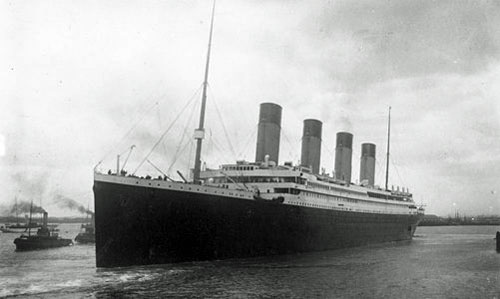
Disasters
Titanic Sinks
The Titanic struck an iceberg 590 km east of Newfoundland on the fifth day of its maiden voyage. It sank in 2 hrs, 40 mins with the loss of 1,522 lives, including the captain and Canadian railway tycoon Charles Melville Hays.
-
October 03, 1914
People
First Canadian Contingent
The First Canadian Contingent sailed from Québec City for England. The largest convoy ever to cross the Atlantic, it comprised over 31,000 troops aboard 31 ocean liners escorted by Royal Navy warships. Also sailing in this convoy was a contingent from the British Dominion of Newfoundland, which was still separate from Canada at that time.
-
July 01, 1916

People
Battle of Beaumont-Hamel
Newfoundland troops captured Beaumont-Hamel in France on the first day of the Battle of the Somme.
-
May 20, 1920
Government and Politics
Newfoundland Petition Calls for General Franchise
Newfoundland suffragists delivered a petition requesting the general franchise for women to the island’s legislature. The petition had 1,700 signatures, and a bill was introduced to move forward on its demand. Later in the year the Liberal government, under Sir Richard Squires, rejected the bill by way of a party vote.
-
April 03, 1925
Government and Politics
Newfoundland and Labrador Women Get Vote
Women over 25 years of age gained the right to vote and to stand for political office in Newfoundland and Labrador.
-
March 01, 1927

Government and Politics
Labrador Boundary Set
The Labrador boundary was settled in its present location by the Judicial Committee of the Privy Council.
-
May 17, 1930
Government and Politics
First Woman Elected to the NL House of Assembly
Helena Squires became the first woman elected to the Newfoundland and Labrador House of Assembly.
-
May 20, 1932
Communication and Transportation
Earhart Begins Transatlantic Flight
Pilot Amelia Earhart took off from Harbour Grace, NL, in an attempt to complete the first female solo flight across the Atlantic. After navigating through a thunderstorm and treacherously icy conditions, she landed safely in Northern Ireland 15 hours later, her mission accomplished.
-
December 02, 1933
Government and Politics
Newfoundland Reverts to Crown
Newfoundland lost its Dominion status due to its financial situation; its constitution was suspended and it reverted to a Crown colony.
-
February 16, 1934

Government and Politics
Newfoundland Commission Government
Newfoundland began its government by a Commission appointed by Britain.
-
December 09, 1935

Sports and Culture
Birth of Christopher Pratt
Painter Christopher Pratt, whose work projects a mood of aloneness and stark, austere beauty, was born at St. John's, Nfld.
-
January 05, 1937
People
Birth of Richard Cashin
Newfoundland union leader Richard Cashin was born at St. John's.
-
December 12, 1942
Disasters
St. John's Fire Disaster
A fire at the Knights of Columbus Hall in St John's, Newfoundland, claimed 99 lives within 7 terrifying minutes. The hall's auditorium was packed with military personnel and civilians for the radio broadcast of "Uncle Tim's Barn Dance."
-
June 03, 1948
Government and Politics
Newfoundland Votes vs Canada
A Newfoundland referendum resulted in 69,000 votes for self-government, 64,000 for union with Canada, and 22,000 for no change in the island's status. Another vote on 22 July showed a majority of 7,000 for union with Canada.
-
January 01, 1949
Indigenous Peoples
First Nations Win Right to Vote Provincially
Except in Nova Scotia and Newfoundland, Status Indians had been barred from voting provincially. Beginning with British Columbia in 1949 and ending with Quebec in 1969, First Nations peoples gradually win the right to vote in provincial elections without losing status or treaty rights.
-
March 31, 1949
Government and Politics
Newfoundland Becomes Province
Newfoundland entered the Dominion of Canada as the 10th province through an Act of Westminster. The first session of the legislature was held at St. John's on 13 July.
-
April 01, 1949

Government and Politics
Smallwood Appointed Premier
Joseph Roberts Smallwood was appointed the first premier of Newfoundland in Confederation.
-
January 01, 1957

Indigenous Peoples Resources and Environment
Terra Nova National Park Established
Terra Nova National Park was established. Canada's most easterly national park, it is located on Bonavista Bay, NF. Terra Nova is the Latin form of the name of the island, Newfoundland. The park shows evidence of Paleo-Eskimo, Dorset, Maritime Archaic and Beothuk cultures.
-
December 31, 1958
People
Newfoundland Loggers Strike
Hundreds of loggers employed by the Anglo-Newfoundland Development Co. at Grand Falls struck for wage increases and for improvements in living conditions at wood camps. Premier Joseph Smallwood intervened on 12 February 1959.
-
January 01, 1970

Resources and Environment
Gros Morne National Park Established
An agreement was signed to establish Gros Morne National Park on the west coast of Newfoundland. In 1987 Gros Morne National Park was designated a United Nations World Heritage Site because of its glacial and geologic history.
-
March 07, 1970

Resources and Environment
Total Eclipse of the Sun
A total eclipse of the sun cast a shadow 160 kilometers wide along Canada's Atlantic coast, sweeping the length of Nova Scotia and across Newfoundland.
-
December 22, 1972
Resources and Environment
Whaling Moratorium
The federal government ordered a halt to all whaling operations based out of Canadian ports. The last West Coast company had stopped whaling in 1967, so the order affected only two shore-based operations in Newfoundland and one in Nova Scotia. The Inuit are still allowed to harvest whales as part of their traditional rights.
-
October 06, 1980
Resources and Environment
Québec-Newfoundland Power Deal
The Québec government approved the signing of a 40-year agreement between Hydro-Québec and the British Newfoundland Corp that allowed Québec to buy power from the Churchill Falls hydro-electric project in Labrador.
-
February 15, 1982
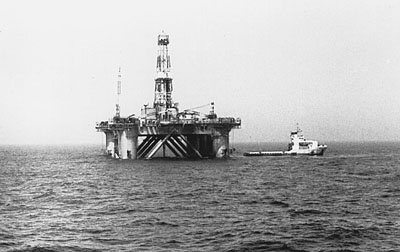
Disasters
Ocean Ranger Capsizes
The Ocean Ranger, the world's largest semi-submersible drill rig, capsized and sank in a storm on the Grand Banks with the loss of all 84 crew members, 56 of whom were Newfoundlanders.
-
February 11, 1985
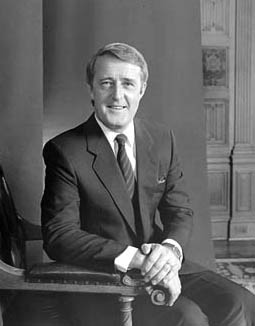
Resources and Environment
Atlantic Accord Signed
Prime Minister Brian Mulroney and Newfoundland premier Brian Peckford signed the Atlantic Accord, an offshore energy agreement to develop the province's offshore petroleum resources.
-
April 02, 1985

Government and Politics
Peckford Wins Newfoundland
Premier Brian Peckford's Conservatives won Newfoundland's provincial election.
-
September 01, 1985

Disasters
Titanic Wreck Found
A US-led expedition discovered the wreck of the Titanic 590 km southeast of Newfoundland at a depth of 3,810 m.
-
August 11, 1986
People
Sri Lankan Migrants Rescued Off Newfoundland
Canadian fishing boats rescued over 150 Sri Lankan refugees off St. Shott’s, NL. The refugees were left in international waters by a smuggler. Without water, food or fuel, the refugees drifted for three days before being spotted. The rescue sparked a debate over how Canada approaches refugees, with some accusing the group of making false claims. In response to a string of similar events, the Mulroney government initiated a reform of the refugee system in 1988.
-
January 05, 1990

Resources and Environment
Fish Plants Closed
Fishery Products International announced plans to close three Newfoundland fish plants, thereby eliminating 1,300 jobs.
-
June 23, 1990

Government and Politics
Meech Lake Accord Collapses
The Meech Lake Accord collapsed after the self-imposed deadline passed. The collapse owed much to Premier Clyde Wells' blockage in Newfoundland and failure to pass in Manitoba thanks to MLA Elijah Harper. It led to further constitutional wrangles and the renewal of the separatist movement in Québec.
-
March 09, 1995
Resources and Environment
Turbot War
Canadian authorities captured a Spanish trawler, the Estai, off Newfoundland and arrested its captain for violations of fishing laws. The Estai was released on 15 March.
-
December 28, 1995

Government and Politics
Wells Resigns
Clyde Wells announced his resignation as premier of Newfoundland.
-
January 17, 1996
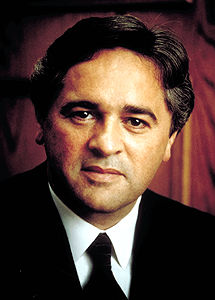
Government and Politics
Tobin Becomes Premier
The Newfoundland Liberal Party elected Brian Tobin as its party leader. Tobin was sworn in as premier on 26 January.
-
February 22, 1996

Government and Politics
Liberals Hold Newfoundland
The Liberals under Brian Tobin won the Newfoundland election, increasing the majority previously enjoyed by Clyde Wells.
-
November 17, 1997

Resources and Environment
Hibernia Produces First Barrel
Newfoundland's Hibernia offshore drilling platform pumped its first barrel of oil.
-
February 09, 1999

Government and Politics
Liberals Keep Newfoundland
The Newfoundland Liberal Party, led by Premier Brian Tobin, won re-election with a reduced majority in the provincial election.
-
February 24, 2006

Sports and Culture
Men's Curling Team Wins Olympic Gold
The rink of Brad Russ Howard, Mark Nichols, Jamie Korab and Mike Adam won Canada''s first-ever gold medal in men''s curling in a final showdown with Finland which Canada won 10-4. Gushue and his teammates became the first Newfoundlanders to win an Olympic medal.
-
January 01, 2008

Resources and Environment
Torngat Mountains National Park Established
Torngat Mountains National Park was established. The park encompasses 9,700 km2 of Labrador north of Saglek Fiord. Torngat — in Inuktitut,Torngait — refers to one of the most powerful of Inuit spirits believed to dwell in these mountains. For thousands of years, this place has been home to Inuit and their predecessors, and remains an Inuit homeland today.
-
March 01, 2009
Disasters
Helicopter Crash Near Nfld
A Cougar Helicopters chopper went down off the coast of Newfoundland after issuing a mayday about technical problems. Officials recovered two life-rafts but no one was aboard. Seventeen of the 18 passengers and crew were lost at sea.
-
December 03, 2010
Government and Politics
First Female Premier of NL
Following the retirement of Premier Danny Williams, Kathy Dunderdale was appointed interim leader of the Progressive Conservative Party and became Newfoundland and Labrador’s first female premier.
-
July 31, 2015

Resources and Environment
Mealy Mountains National Park Reserve Established
The Canadian government announced the creation of Canada's 46th national park, the Mealy Mountains National Park Reserve in Labrador. Occupying an area the size of Jamaica, it is co-managed by the Innu, whose names for the area are Akami–uapishku and KakKasuak.
-
November 19, 2015

Sports and Culture
Death of Ron Hynes
Singer-songwriter Ron Hynes, whose powerful stories and characters moved audiences far beyond the shores of his native Newfoundland, died in St. John's at the age of 64.
-
November 30, 2015

Government and Politics
Liberal Victory in Newfoundland and Labrador
Liberal candidate Dwight Ball was elected premier of Newfoundland and Labrador in the province's 20th general provincial election. The Liberals won by a landslide, taking 31 of the province's 40 seats. The Conservatives, who had governed for the preceding 12 years, won seven seats and the NDP took two.
-
November 24, 2017
Indigenous Peoples
Trudeau Issues Newfoundland and Labrador Residential Schools Apology
Prime Minister Justin Trudeau apologizes to the Survivors of residential schools in Newfoundland and Labrador who were excluded from Stephen Harper’s 2008 apology because residential schools there were not run by the federal government and were established before Newfoundland joined Confederation in 1949. Survivor Toby Obed, who was instrumental in the class-action lawsuit against the federal government, accepted Trudeau’s apology on behalf of his community. However, Gregory Rich, Innu Nation Grand Chief, refused Trudeau’s apology on behalf of the Innu Nation, saying it was too narrow.

